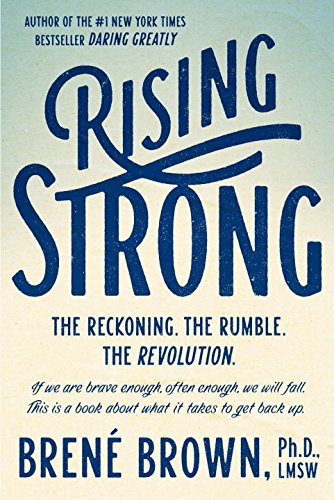
When we deny our stories, they define us.
When we own our stories, we get to write the ending.
Social scientist Brené Brown has ignited a global conversation on courage, vulnerability, shame, and worthiness. Her pioneering work uncovered a profound truth: Vulnerability—the willingness to show up and be seen with no guarantee of outcome—is the only path to more love, belonging, creativity, and joy. But living a brave life is not always easy: We are, inevitably, going to stumble and fall.
It is the rise from falling that Brown takes as her subject in Rising Strong. As a grounded theory researcher, Brown has listened as a range of people—from leaders in Fortune 500 companies and the military to artists, couples in long-term relationships, teachers, and parents—shared their stories of being brave, falling, and getting back up. She asked herself, What do these people with strong and loving relationships, leaders nurturing creativity, artists pushing innovation, and clergy walking with people through faith and mystery have in common? The answer was clear: They recognize the power of emotion and they’re not afraid to lean in to discomfort.
Walking into our stories of hurt can feel dangerous. But the process of regaining our footing in the midst of struggle is where our courage is tested and our values are forged. Our stories of struggle can be big ones, like the loss of a job or the end of a relationship, or smaller ones, like a conflict with a friend or colleague. Regardless of magnitude or circumstance, the rising strong process is the same: We reckon with our emotions and get curious about what we’re feeling; we rumble with our stories until we get to a place of truth; and we live this process, every day, until it becomes a practice and creates nothing short of a revolution in our lives. Rising strong after a fall is how we cultivate wholeheartedness. It’s the process, Brown writes, that teaches us the most about who we are.
An Amazon Best Book of August 2015: You may be someone who looks at Rising Strong and says, “oh, that’s not really for me….” Translation: I don’t read or need that self-help stuff, give me a good novel and go away. But Brené Brown isn’t a spiritual guru, or someone who’s risen from the ashes to tell us how to live our lives. She’s a researcher. And Rising Strong isn’t some feel-good-get-over-it regimen; it’s more investigative reporting on the common denominators of people who whole-heartedly get back up and go another round after getting their asses handed to them in big and small ways. In her straightforward Texan voice, Brown sets the table for us to get curious about life’s sticky moments and invites us to serve ourselves a plate of what she’s learned in over a decade of research. I don’t know about you, but I’m not trying to be famous or come up with a cure that will change the world, I just want to live happily and keep getting back in the arena whether I’ve been rocked on my heels, knocked to my knees, or gone face down in the dirt. For my money, seeing how I can do that better is worth reading about. – Seira Wilson

Brene does it again! Rising Strong continues on past where her earlier books started us on the journey Having found great benefit in Brene’s earlier books (The Gift of Imperfection and Daring Greatly), I was looking forward to this book and was delighted to be offered the chance to read an advance copy. Rising Strong is, I believe, even better than her earlier works. Though it part, that is probably related to the fact that all three books are interrelated, with each building on the one that came before.
An uplifting book about how to rise up when you’ve fallen I’m new to Brene Brown, having just read her book six months ago. I had seen her name referenced online, but, before reading that book, had never watched her popular TED Talk or seen any of her television appearances; however, I was drawn to _The Gifts_ because the book’s focus on coming to terms with one’s sense of…
A bold call to fall, get up, and try again This book definitely works as a standalone piece, but it’s meant to build upon her prior works. As Brene shares in the first chapter, the progression of her works is that the first book, http://www.amazon.com/The-Gifts-Imperfection-Supposed-Embrace/dp/159285849X, has the message “Be you,” while the next one, http://www.amazon.com/gp/product/1592408419/, is a call to “Be all in.” This book? “Fall. Get up. Try again.”